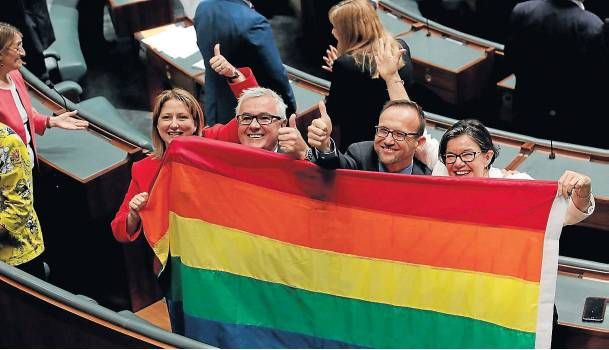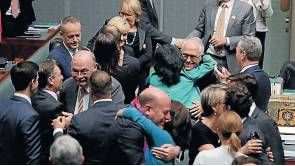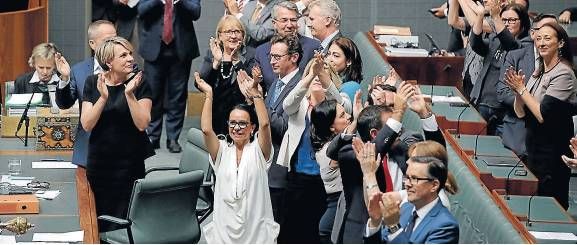The federal Parliament has removed the final area of discrimination against gay and lesbian Australians by giving them the right to marry.
In a historic moment of social reform, the House of Representatives voted just before 6pm on Thursday to legalise same-sex marriage, paving the way for weddings in the New Year.
As the vote was announced, the public galleries of Parliament, stacked with people who had spent years fighting for equality, and waited all day for the vote, erupted in cheers and applause. Rainbow flags were unfurled and people sang.
Conservatives including Tony Abbott, Craig Kelly, Barnaby Joyce and Kevin Andrews walked out.
Those in the galleries included Olympic champion Ian Thorpe, actress Magda Szubanski, former Australian Medical Association president Kerryn Phelps, and Sydney City councillor and sister of Tony Abbott, Christine Forster.
Watching on from the sidelines were pro-same-sex marriage senators from all parties, all of whom joined in the celebrations.
‘‘What a day, what a day for love, for quality, for respect. Australia has done it,’’ said Prime Minister Malcolm Turnbull told Parliament as the debate wrapped up. ‘‘This belongs to us all, this is Australia, diverse, loving and filled with respect.’’
Labor leader Bill Shorten said ‘‘the Australia of tomorrow begins with what we do today’’.
‘‘At long last, LGBTQI Australia will be equal under the law.
‘‘All law will speak for a modern Australia, inclusive and fair.’’
After a gruelling day of debate, the bill passed the lower house unamended as it didthe Senate the week before, meaning the result is final. The bill, a private members bill was co-sponsored by Liberals, Labor, the Greens and crossbenchers. It contained basic protections for religious freedoms including exempting churches, synagogues, mosques and other religious institutions from having to marry gay coupes if it was against their doctrine.
But a raft of other protections pushed by conservatives, which samesex marriage advocates said were not related to marriage, failed, as they did in the Senate.
These included exempting civil celebrants from having to marry gay couples, protecting religious charities from losing their tax-exempt status if they express a view against same-sex marriage, and giving parents the right to withdraw their children from classes if they disagreed with the material being taught. As the amendments were successively voted down throughout a long day, the public gallery cheered each time.
The vote brings to an end one of the more polarising political issues of the past decade, made possible by Mr Turnbull being the first Australian Prime Minister to support same-sex marriage.
Nonetheless, a majority of Liberals and Nationals voted for the amendments, underscoring the divide within the Coalition.
Mr Joyce ended months of rumours by confirming his marriage was in trouble as he spoke in support of some amendments. ‘‘I am currently separated,’’ he said, adding he was ‘‘no saint’’.
Mr Turnbull turned up for some of the votes on the amendments. For example, he supported one which would exempt military chaplains from having to marry a gay couple. That vote was lost 59-87. He also, unsuccessfully, supported amendments to exempt civil celebrants and protect charities.
Treasurer Scott Morrison personally moved amendments to protect religious charities and other faith-based organisations. They were defeated 59-82.
Mr Abbott complained to Parliament that the process was being rushed, contrary to the assurances given by Mr Turnbull and Mr Shorten.
He said a separate inquiry into religious freedoms, to be led by former Liberal MP Philip Ruddock, was not good enough because, he claimed, religious freedoms were already being infringed.
‘‘Injustices are happening this day, let us deal with it now. Let us not kick it all off into the long grass,’’ he said .
Earlier in the day, an attempt by Mr Abbott to delay the vote by moving an obscure amendment during what is known as the second reading phase of the bill failed to enlist support. Mr Abbott did not ask for a head count when the vote was taken and allowed it to be done ‘‘on the voices’’.
‘‘Out of respect for the millions of Australians who take religious freedom seriously I moved my amendment; out of respect for the millions who want the SSM bill swiftly passed I chose not to divide on it,’’ he tweeted.


